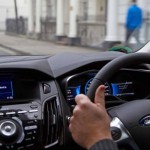 One of the interesting aspects of the advances made in driverless technology is that it has enabled a new breed of automaker to enter the market. Companies such as Google have led the way, and it is forcing change in the industry.
One of the interesting aspects of the advances made in driverless technology is that it has enabled a new breed of automaker to enter the market. Companies such as Google have led the way, and it is forcing change in the industry.
Towards the back end of last year, a lot of buzz was created by the rumor that Ford were about to team up with Google to work on automated technologies together.
In the end, that particular rumor didn’t come to anything, but Ford has certainly been busy, on both the partnership and automation front.
Connected motoring
For instance, at the recent CES event, they announced a partnership with retail giant Amazon to explore ways that smart vehicles could be connected up with the home via Amazon’s Echo smart home hub service.
This would allow motorists to talk with their home and check if their garage door is open or schedule an appointment with their local mechanic for a service. They could even control various home appliances, such as security systems or thermostats, from their car.
A commitment to automation
Despite the apparent stalling of any partnership with Google, Ford do appear committed to driverless technology. They announced a tripling of their autonomous Fusion sedan fleet.
“Using the most advanced technology and expanding our test fleet are clear signs of our commitment to make autonomous vehicles available for millions of people,” they said. “With more autonomous vehicles on the road, we are accelerating the development of software algorithms that serve to make our vehicles even smarter.”
It’s a welcome move from a company that has been quieter than most on the prospect of driverless technology, and it seems likely that the technology will require a mass market manufacturer to really deliver it to market on a large scale.
Indeed, only Tesla have managed to release an automated product onto the market, and their vehicles are certainly at the higher end of the price range.
Mass market appeal
That isn’t something that you could accuse Ford of, with the majority of their vehicles having distinctly mass market appeal. Hopefully their commitment to Smart Mobility will help to both develop and reduce in price the kind of sensors and other systems that are fundamental to driverless technology.
So whilst a partnership with Google does not appear to be on the cards just yet, it will nonetheless be interesting to see just what inroads Ford manage to make in developing smarter, and eventually autonomous, vehicles.
Check out the video below to learn more about the Smart Mobility concept
https://www.youtube.com/watch?v=5E_LYRDvixY
Nice Article,
whether you are using a smart car or a simple car always try to make your cars more secure using smart devices like smart cop, keyless go and many more.
This would be so liberating for people with low vision who at the moment are not allowed to drive ( understandably).
So if the driver is the car, what happens if there us a malfunction and the car is involves in an accident. Who is liable? Is it the car owner who was not in control of the car? Is it the dealer who sold the car? Is it the manufacturer? Is it the software company? Hmmmm! I think the liability issue looms large especially if it is the person who bought the car. 🙂
Why are we not rethinking the whole car thing? Driverless cars? Why not no cars? Sometimes we continue to look down the wrong end of the telescope.
Besides Uber, Lyft, is there really a demand for self driving cars? Taxi companies' interest lies in eliminating employees. Many people still enjoy driving.